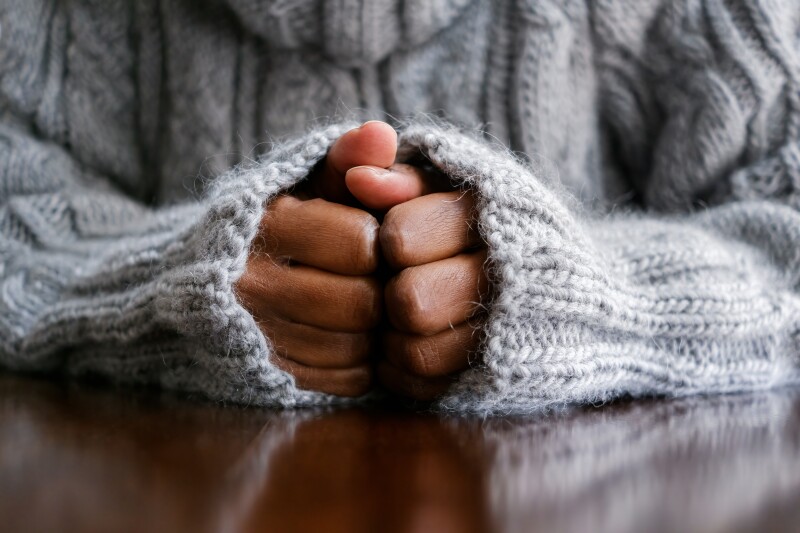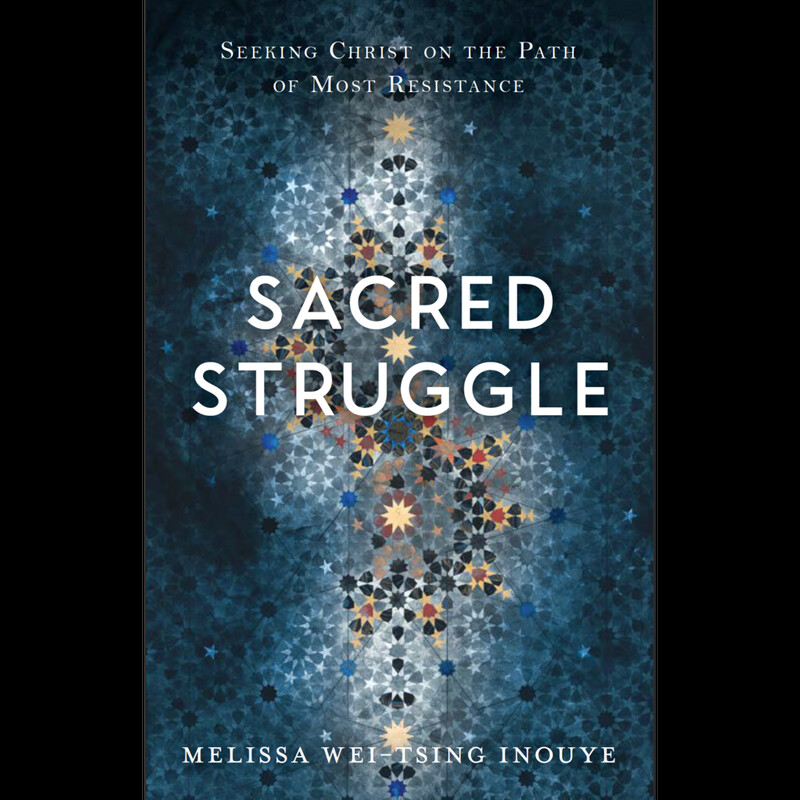Editor’s note: After a long battle with cancer, Melissa Wei-Tsing Inouye recently passed away. We share this excerpt from her book Sacred Struggle as a tribute to her incredible life of scholarship and discipleship, for which we will be forever grateful. Our hearts and prayers are with Melissa’s family.
I am curled in the fetal position on the sidewalk outside my house. I have finished work for the day and walked home from the local train station. I walked up to the front of my house, then paused on this spot on the sidewalk.
I don’t want to go inside. Inside the house, there are dishes to do, rooms to clean, digital devices to police, mouths to feed, and teenagers to parent. Late summer shadows are creeping across the valley. Feeling chilly, I try to absorb every photon. As long as I don’t go inside, perhaps I can avoid the reality of my life.
But even if the chaos inside the house were fixed, what will fix me? Inside my body, just below my right-side rib, I can feel the bulge of a tumor growing exuberantly within my liver. I feel like I’m running out of time, and I’m so sad.
My sister-in-law, Beth, comes out of the house and quietly sits next to me on the sidewalk.
Tears slide down my cheeks and sink into the concrete. “It’s too much,” I say. “I want another life.”
“It’s okay,” Beth says.
Much of the time, we feel adequate in rising to meet the daily challenges before us. We have the gospel. We know the plan. We’ve got the training, the education, the good habits, and the work ethic. We’ve got friends, family, and ministering sisters and brothers. We know God will prepare a way, as for Nephi, and that God has prepared us, as with Esther.
And yet, sometimes we simply feel to sit down in the road of life and weep.
Life can be really hard.
As Latter-day Saints, we proudly claim the gift of agency. We are proud to have sided with Christ in the premortal struggle over agency in heaven. We feel sorry for the hosts of spirit sisters and brothers who chose to follow Lucifer because they were too frightened at the prospect of living life in a physical body, subject to the laws of nature and the agency of others.
Lucifer promised that “one soul shall not be lost” and requested “only” that he receive God’s full power in order to accomplish his goal of steering God’s children unerringly through life. Whenever we were about to put a foot wrong, he would intervene and put us right. We would not be allowed to make stupid, self-defeating choices, even when pushed to our limits by the raw, elemental forces of life in the physical world.
As a novice parent, I am sometimes quite envious of “Satan’s plan.” Satan’s kids would all get accepted at Ivy League colleges because they would always choose to do their homework and develop their talents before playing video games. Satan’s kids wouldn’t have brain health issues or life-altering physical injuries because Satan would manipulate chemicals in the brain and the laws of physics to keep the mind and body humming along beautifully. Satan’s kids would never leave towels on the floor and would never leave an important job unfinished. It wouldn’t just be unthinkable; it would be un-doable.
As a parent with a life-threatening illness, I can easily say that the pain of parenting is far more acute than the pain of impending death. I don’t know if this makes people feel better or worse. People often say, apologetically, when telling me about a trial in their life, “I know it’s nothing compared to what you’re going through . . .” The truth is, in all of our lives, including my life, quite often impending doom ranks far below more quotidian anxieties—for instance: the anxiety of hoping a kid will make the right choices; or an acute attack of seasonal allergies; or even the sting of the sudden realization: “Oh shoot! I missed [Child]’s [activity]!”
But, no doubt about it—for me, the pain that comes when someone you love is suffering is far, far worse than any sort of threat to one’s own health or life.
Amidst life’s everyday stresses sometimes it is quite easy for us to wish that God will take the helm, not simply whispering suggestions or sending us charts and maps or even cheering enthusiastically from a few paces back, but seizing the wheel of the ship in an iron grip and just taking over for an extended period of time, flattening the waves and working around storms. Perhaps we could keep this divine autopilot on until the kids are grown, or until I’m free of health difficulties, or even, until the very end, when the ship triumphantly sails back into the heavenly marina.
The appeal of “Satan’s plan,” in which the living is easy, teaches us another fundamental truth: Life is hard, though we wish it were easy. We wish we could get from point A to point B without having to traverse the steep, often treacherous terrain that connects those two points. We wish we could become skilled navigators without facing many terrifying storms on our own.
This, too, was Lucifer’s ambition. He wanted to have the power of God, power that would make him godlike to his mortal sisters and brothers, without going through the period of learning and trial that would naturally develop that power in him. In proposing his plan, therefore, he was hoping to be the first to take a shortcut—to receive the capacity of godliness all at once, not cultivate it over time and throughout much difficulty. He offered us, and himself, the path of least resistance.
But our Heavenly Parents had a different plan. It was so fraught and full of struggle, it required the active assistance of a Savior, Jesus Christ, who would reach out and bring us back from the abyss. We would inevitably suffer physical degradation and die. Christ would create a way for us to live again. We would inevitably make the wrong choices, harming others and our own spirits. Christ would heal those harms and give us opportunities to try again. And Christ would show us the way, if we would only follow Him—a path with no shortcuts. He offered us, and Himself, the path of most resistance.
The truth of life’s difficulty and the truth of our desire to be free from difficulty are made even harder to bear by a third truth: life’s unfairness. If only the good always prospered and only the evil always came to an ignominious end! If only every child were born into a situation in which they were loved, treasured, and cared for all alike! If only violent, bone-shattering car accidents happened to people who were growing old and tired of life and not to young, vibrant people in life’s prime!
Seriously, universe!? I find myself saying frequently. This is what you’re going to do!?
Here, too, the plan of salvation has offered us the path of most resistance. Instead of everyone being born on an exactly level playing field, so we know everything we do well or poorly is entirely because of our own merit, many of the circumstances in our lives are varied beyond any hope of control. It will never be possible for us to tick all the boxes, to be certain that we have fulfilled all requirements, in any measurable or comparable way.
Thus, how we spend our time and care is between us and those around us. What we do with our life is between us and God. It’s not a competition. It’s an opportunity to fully inhabit the physical and spiritual dimensions that make us like our divine Mother and Father, so we can begin to grow into their capacity and wisdom.
I am rock climbing with the children and my husband on a beautiful autumn day in the mountains. My daughter shimmies up a steep chimney formation about thirty feet high in bare feet, with no shoes and no rope. I would scold her, but I was preoccupied teaching my oldest son to set up the rope safely. The kids are growing taller and stronger than me. I am happy to be eclipsed.
We spend a few relaxed hours outside, trying some new routes. The older kids take videos of each other climbing on their phones. The youngest kid is throwing rocks to his heart’s content.
To return to the car, we scramble down a field of loose rock called talus. The autumn sun slants through the trees. On the ride home, all are tired and happy. I feel my tumor, like a misplaced lump in the throat, but today it doesn’t scare me.
I’m grateful for this beautiful day. I’m grateful for my beloved family. I’m grateful my Mother and Father in Heaven created this beautiful world and placed me in it, as lovingly as they placed the trees and the bumblebees and the piles of majestic rock.
Life is good.



